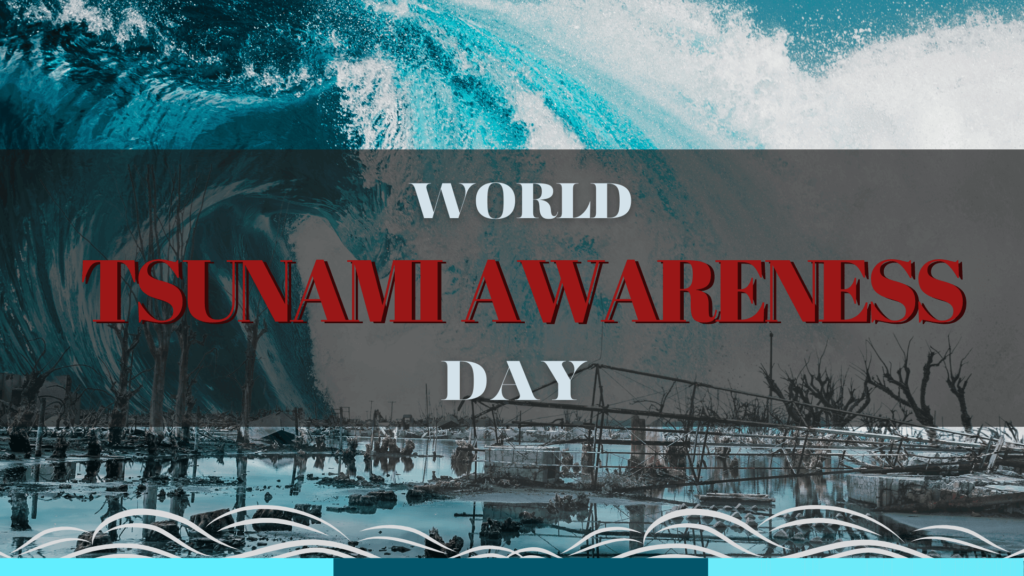World Tsunami Awareness Day, observed annually on November 5, was established by the United Nations to promote global understanding of tsunamis and the steps communities can take to stay safe. The theme for 2024, “Reducing Tsunami Risks for a Resilient Future” emphasizes proactive strategies to prepare for and mitigate tsunami impacts, particularly as climate change increases the frequency and severity of natural disasters.  Among the most destructive natural catastrophes, tsunamis can result in significant infrastructure destruction, a high death toll, and long-term environmental effects. In the past, coastal areas in the Pacific, Atlantic, and Indian oceans have been struck by tsunamis. Over 230,000 people were murdered in the devastating 2004 Indian Ocean tsunami, which serves as a sobering reminder of the need for readiness. In 2024 seeks to emphasize that although tsunamis cannot be avoided, their effects can be lessened through international events like World Tsunami Awareness Day.
Among the most destructive natural catastrophes, tsunamis can result in significant infrastructure destruction, a high death toll, and long-term environmental effects. In the past, coastal areas in the Pacific, Atlantic, and Indian oceans have been struck by tsunamis. Over 230,000 people were murdered in the devastating 2004 Indian Ocean tsunami, which serves as a sobering reminder of the need for readiness. In 2024 seeks to emphasize that although tsunamis cannot be avoided, their effects can be lessened through international events like World Tsunami Awareness Day.
Communities, governments, and organizations are urged by the 2024 campaign to focus on three primary objectives.
1. Planning for Risk Reduction: Emphasizing early warning systems, infrastructure modifications, and evacuation preparation.
2. Community Education and Preparedness: Informing people about the dangers of tsunamis and teaching local authorities and citizens how to be ready.
3. International Cooperation and Data Exchange: Strengthening international efforts to track seismic activity and disseminate information quickly.  Particularly for coastal and island countries, UNESCO and the UN Office for Disaster Risk Reduction (UNDRR) are hosting in-person workshops and online seminars. Resources and training, particularly on enhancing the efficacy of early-warning systems, will be made available at 2024’s Tsunami Awareness Day events. It is anticipated that tsunami-affected nations including Indonesia, the United States, and Japan will be central to the awareness campaign.
Particularly for coastal and island countries, UNESCO and the UN Office for Disaster Risk Reduction (UNDRR) are hosting in-person workshops and online seminars. Resources and training, particularly on enhancing the efficacy of early-warning systems, will be made available at 2024’s Tsunami Awareness Day events. It is anticipated that tsunami-affected nations including Indonesia, the United States, and Japan will be central to the awareness campaign.
In addition to attending instructional workshops and taking part in local evacuation drills, people are urged to educate themselves on the warning signals of an approaching tsunami, such as fast sea withdrawal. Numerous groups also support “Last Mile” programs, which teach individuals in isolated coastal communities about safety precautions and the use of modern technologies in disaster response is becoming increasingly important as the globe embraces digital transformation. Satellite-based monitoring systems and artificial intelligence are becoming more and more important in identifying shifts in ocean patterns and warning communities that are at risk. The theme for 2024 emphasizes the necessity of resilient technologies that can help communities bounce back from disasters more quickly.  In this Tsunami Awareness Day, let’s all play a part in spreading awareness and promoting education that could one day save lives.
In this Tsunami Awareness Day, let’s all play a part in spreading awareness and promoting education that could one day save lives.
Written By: –

Rtr. Tharushi Nawodya
(Junior Blog Team Member 2024-25)
Edited By: –

Rtr. Moksha Munasinghe
(Junior Blog Team Member 2024-25)


